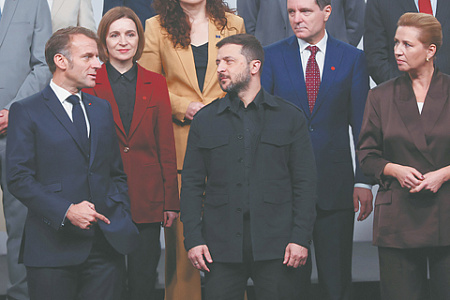
The European Union is shifting its immediate focus for Ukraine from political integration to military reinforcement, as Hungary continues to veto the start of Kyiv’s formal accession talks. Following a European Political Community (EPC) summit in Copenhagen, Brussels has outlined clear priorities to bolster Ukraine’s defense capabilities, signaling that advanced weaponry will arrive long before a membership card. The plan involves accelerating the delivery of drones, air defense systems, and long-range weapons, to be funded by the profits generated from Russian assets frozen within the EU.
The EPC gathering, an initiative by French President Emmanuel Macron, brought together leaders from the 27 EU member states and over 20 other European nations, including the UK, Turkey, and Ukraine. The summit aimed to create a united front against what Danish Prime Minister Mette Frederiksen described as the “really big security threat” posed by Russia. The message was clear: all of Europe is expected to contribute to countering Moscow’s aggression, with Ukraine on the front line.
President Macron detailed the urgent military aid priorities, emphasizing the need to speed up both the supply and joint financing of drone, air defense, and long-range missile projects for Kyiv. In a notable development, Macron also referenced a future “drone wall”—a defensive project planned for next year to protect the EU’s borders with Russia. He assured that this ambitious security shield would incorporate the hard-won expertise Ukraine has gained during its conflict, turning battlefield lessons into a continental defense strategy.
However, the summit also laid bare the deep political divisions fracturing the EU’s unanimity. A sharp exchange between Polish Prime Minister Donald Tusk and his Hungarian counterpart, Viktor Orbán, highlighted the ongoing friction. Tusk implicitly accused Orbán of aligning with Moscow, a charge that did not sway the Hungarian leader. Orbán firmly reiterated his opposition to opening EU membership negotiations with Ukraine, proposing a less committal “strategic partnership” instead.
This deadlock extends to the financial mechanism for aiding Ukraine. While most EU nations are hesitant to fully confiscate frozen Russian assets due to fears of damaging their investment climates and provoking retaliation from Moscow, Orbán also opposes the use of profits from these funds. The decision ultimately requires unanimous consent. As the bulk of the assets are held in Belgium’s Euroclear depository, Belgian Prime Minister Bart De Wever stressed that any use of these funds for Ukraine would require the green light from all EU leaders, effectively giving Hungary a powerful second veto over a key pillar of support for Kyiv.
